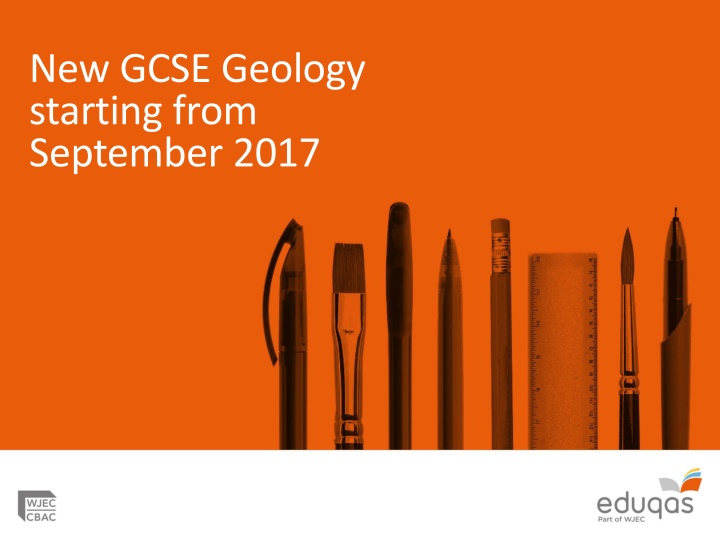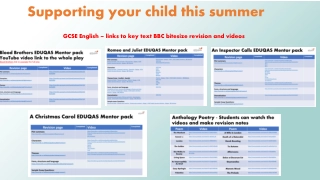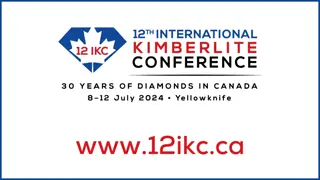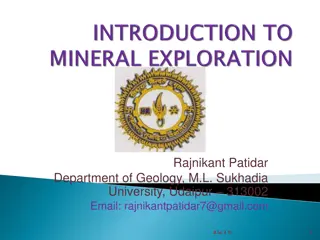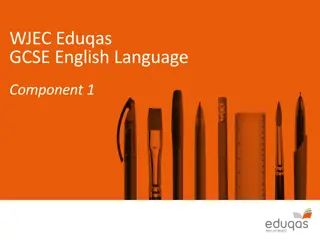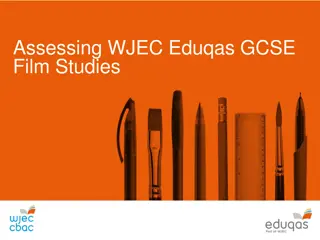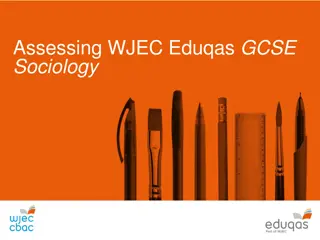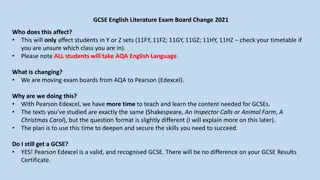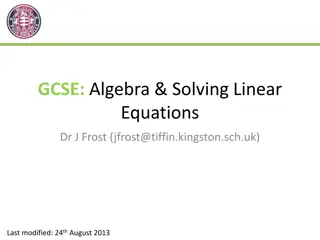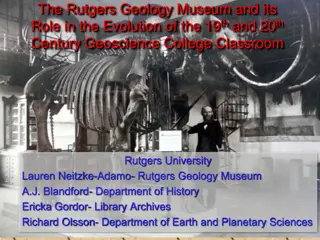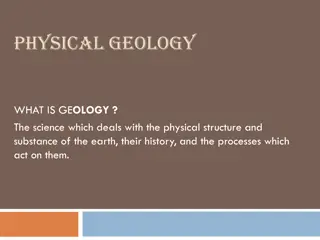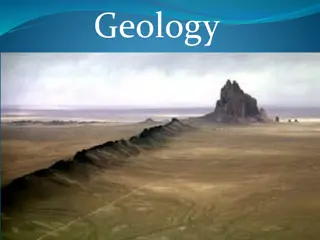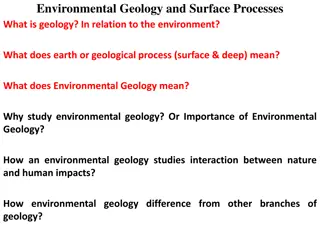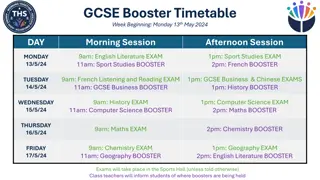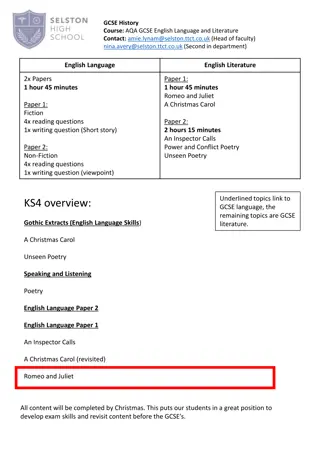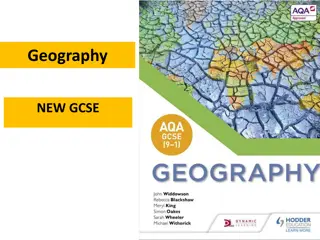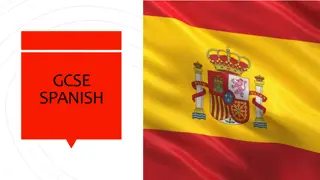New GCSE Geology Overview and Assessment Details
Explore the new GCSE Geology starting from September 2017, introduced under the Eduqas brand. The course offers a comprehensive examination structure with components including Geological Principles assessments involving multiple-choice and structured writing questions. Contact details for subject officers are provided for further assistance and information.
Download Presentation

Please find below an Image/Link to download the presentation.
The content on the website is provided AS IS for your information and personal use only. It may not be sold, licensed, or shared on other websites without obtaining consent from the author.If you encounter any issues during the download, it is possible that the publisher has removed the file from their server.
You are allowed to download the files provided on this website for personal or commercial use, subject to the condition that they are used lawfully. All files are the property of their respective owners.
The content on the website is provided AS IS for your information and personal use only. It may not be sold, licensed, or shared on other websites without obtaining consent from the author.
E N D
Presentation Transcript
New GCSE Geology starting from September 2017
AGENDA 1.00 1.10 Introduction 1.10 2.30 2.30 3.00 The new GCSE Geology Coffee / Opportunity for discussion with subject officer & principal examiner 3.00 3.40 Resources 3.40 4.00 Opportunity for discussion with subject officer & principal examiner
Contact details Subject Officer: Dave Evans david.evans@eduqas.co.uk Subject Support Officer: Sarah Price sarah.price@eduqas.co.uk 029 2026 5103
INTRODUCING EDUQAS In light of the diverging qualifications between England and Wales, WJEC has developed a new brand: Eduqas. Eduqas will be the brand that provides schools with WJEC s newly reformed Ofqual regulated GCSEs, AS and Alevels. Eduqas enables teachers to clearly distinguish between legacy qualifications in Wales and reformed qualifications in England. Eduqas qualifications will primarily be available in England but also in Northern Ireland, Isle of Man and the Channel Islands at any schools offering Ofqual regulated qualifications.
Summary of assessment GCSE Component 1: Geological Principles On-screen examination: 1 hour 15 minutes 50% of qualification An on-screen assessment consisting of data and stimulus response questions This assessment requires multiple-choice, short, structured and extended writing answers relating to all the GCSE Geology subject content outlined in this specification A data sheet is used in this assessment
Multiple Choice questions: GCSE Example of a multiple choice question: (i) Describe the mode of life of the fossil coral in Photograph 2f. Tick ( ) only one box. [1] lived as a colony fixed to the sea bed swam in fresh water not mobile and lived on land crawled around the sea bed floated in the surface waters of the oceans
Structured writing question: GCSE Example of a structured extended writing question: (ii) Explain why the size of the crystals in the igneous intrusion in Figure 3a becomes coarser along the line from X to Y. [2]
Extended writing questions: GCSE Example of 6 mark extended writing questions: Refer to Figures 2c and 2d, and Photographs 2e and 2f. Interpret and evaluate the evidence for changes in the latitude of the British area over geological time. [6 QER] Refer to Photographs 5a and 5b and the principle of uniformitarianism. Analyse and interpret the evidence that enabled scientists to conclude that the rocks at Gale Crater were deposited by water flowing towards the East. [6 QER]
Summary of assessment GCSE Component 2: Investigative Geology Written examination: 1 hour 30 minutes 50% of qualification A written assessment consisting of data and stimulus response questions Has short, structured and extended writing answers to investigate the geology of an area shown on a simplified geological map It is wholly based on the area covered by the geological map A data sheet is used in this assessment
Example of a question related to the map (d)Figure 1b is a photomicrograph of a sample taken from the igneous body at Locality 1 on Map 1. (i) Describe the texture of the rock shown in Figure 1b.[3]
Structure of the specification GCSE The specification is structured into four key ideas. Key Idea 1: Rock exposures contain evidence of how rocks were formed and subsequently deformed. This key idea enables candidates to analyse and interpret rock exposures from primary and secondary evidence. It is divided into 5 topics: Minerals Igneous rocks and processes Sedimentary rocks and their fossil content Metamorphic rocks and processes Deformational structures.
Structure of the specification GCSE Key Idea 2: Major concepts and techniques underpin our current understanding of the Earth and its history. This key idea enables candidates to demonstrate an understanding of the big ideas in geology. It is divided into five topics: The rock cycle Plate tectonics Geochronological principles Global climate and sea level change The origin and development of life on Earth.
Structure of the specification GCSE Key Idea 3: Comparisons of the Earth with other planetary bodies within the Solar System provide evidence for the origin and evolution of both. This key idea enables candidates to appreciate the links between natural processes on Earth and those on other planetary bodies within the Solar System. = Planetary Geology
Structure of the specification GCSE Key Idea 4: Human interaction with the Earth can increase or reduce risk. This key idea enables candidates to appreciate the cause and effect of human interactions with the natural environment. Key Idea 4 has been divided into two topics: Earth hazards and their mitigation Earth resources and engineering.
Components and specification content GCSE The context in which the content is assessed across the two components differs. In Component 1, the whole of the content of the specification is assessed in a theoretical way. In Component 2, a more practical approach, with the assessment structured to investigate the geology of an area shown on an accompanying simplified geological map. This assessment is wholly based on the area covered by the geological map.
SUMMARY Main changes to assessment GCSE Loss of coursework. Preparing learners for 2 written components (2 hours 45 minutes). Decrease in the proportion of marks from multiple choice questions. Increase in number of marks and length of responses from extended writing. e.g Three 6 mark questions compared with two 4 mark questions currently.
SUMMARY Main changes to assessment GCSE There will be a minimum 15% of the marks for the qualification awarded for assessment of geological skills and techniques, listed in Appendix B of the specification. There will be a minimum of 10% of the marks for the qualification awarded for Maths skills at a level of demand not lower than that which is expected of learners at key stage 3.The required Maths skills are listed in Appendix A of the specification.
SUMMARY Main changes to assessment GCSE Examples of mathematical questions in the Sample Papers: In Cheshire in the UK there are evaporite deposits which are 200 metres thick. On average a 5 centimetre thickness of evaporite is produced by the evaporation of 3 metres depth of sea water Calculate the depth of sea water that must have evaporated to produce a 200 metre thick layer of evaporite. Show your working. [3] Depth of sea water = ..m
SUMMARY Main changes to assessment GCSE Calculate the relative density of haematite using the data in Table 5 and the formula below. Show your working.Give your answer using an appropriate number of significant figures. [3] Calculate the relative density of haematite using the data in Table 5 and the formula below. Show your working. Give your answer using an appropriate number of significant figures. [3] weight in air Relative density= weight in air weight in water Mineral Haematite weight in air (N) 0.01 weight in water (N) 0.008
SUMMARY Main changes to assessment GCSE Figure 2c
SUMMARY Main changes to content GCSE There should be a familiar feel to a significant portion of the content but there are some new topics in the specification e.g. Planetary geology The development of the concept of deep time The restoration of contaminated ground Borehole correlation using microfossils Modern laboratory techniques in the study of mineral samples e.g. the scanning electron microscope electron microprobe
Fieldwork in GCSE Geology Learners are required to undertake a minimum of two days of work in the field in order to develop their field observation and practical skills. To develop learners' problem solving skills, it is expected that during at least one of these days they should have at least one opportunity to carry out a directed investigation to answer a geological problem e.g. an investigation to determine the environments of deposition of a sequence of sedimentary rocks. e.g. an investigation to determine the effects of tectonic stresses at a field location. Centres should feel able to devise alternative examples of directed investigations relevant to the field locations used.
Fieldwork in GCSE Geology Each centre must provide a fieldwork statement to WJEC that details the fieldwork carried out in each assessment cycle. This can include local fieldwork outside the classroom but must also involve fieldwork on unfamiliar outcrop geology. Fieldwork must give learners the opportunity to complete the required practical skills that are field based (e.g. construction of graphic logs, location of geological features onto base maps, production of field sketches, measurement of dip and strike elements).
Practical skills in GCSE Geology Practical work is an intrinsic part of the Eduqas GCSE specification in Geology. At GCSE there is a requirement for learners to become competent in a number of practical skills and techniques. These are listed in the specification (Appendix B) and learners will be assessed on these in the written components. These include: field-based skills e.g. construction of a graphic log lab-based skills e.g. the measurement of mass
Eduqas Resources to support the new GCSE Geology
Eduqas Resources: GCSE Geology These will include: A detailed guidance for teaching document Digital resources for teaching Useful subject web pages Easily contactable subject officer and support officer Regular e mail bulletins
